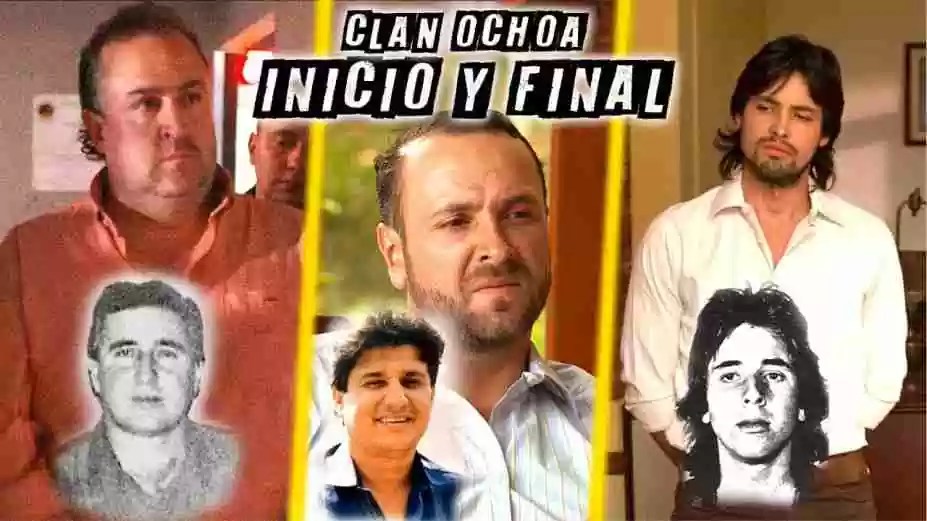Hermanos Ochoa: The Rise And Fall Of The Medellin Cartel
The story of the Hermanos Ochoa and their involvement with the Medellin Cartel is a gripping tale of ambition, power, and the dark underbelly of the drug trade. As one of the key players in the notorious Medellin Cartel, the Ochoa brothers were instrumental in shaping the drug landscape of the 1980s and early 1990s. This article delves into their journey, shedding light on their operations, influence, and the eventual downfall that marked the end of an era.
In this comprehensive exploration, we will cover various aspects of the Ochoa brothers' lives, including their biographical details, the formation and impact of the Medellin Cartel, and the intricate web of connections that allowed them to thrive in the drug trade. We aim to provide a well-rounded understanding of their legacy, which continues to resonate in discussions about drug policy and crime in Colombia.
As we navigate through the complexities of their story, we will also examine the broader implications of the Medellin Cartel's activities on society, law enforcement, and international relations. With credible sources and thorough research, we aim to present a narrative that is not only informative but also engaging for readers interested in the intricacies of organized crime.
Table of Contents
- 1. Biography of the Ochoa Brothers
- 2. Formation of the Medellin Cartel
- 3. Key Operations of the Ochoa Brothers
- 4. Influence on Colombian Society
- 5. Law Enforcement Response
- 6. The Downfall of the Ochoa Brothers
- 7. The Legacy of the Ochoa Brothers
- 8. Conclusion
1. Biography of the Ochoa Brothers
The Ochoa brothers, Jorge Luis, Juan David, and Fabio, were born in Medellin, Colombia. They came from a modest background and were known for their entrepreneurial spirit from a young age. In the 1970s, they began their foray into the drug trade, initially dealing in marijuana before transitioning to cocaine.
Personal Data and Biodata
| Name | Date of Birth | Role in the Cartel |
|---|---|---|
| Jorge Luis Ochoa | 1947 | Key Leader |
| Juan David Ochoa | 1954 | Key Leader |
| Fabio Ochoa | 1956 | Key Leader |
2. Formation of the Medellin Cartel
The Medellin Cartel was formed in the late 1970s as a coalition of various traffickers, with the Ochoa brothers playing a pivotal role in its establishment. They allied with other influential figures, including Pablo Escobar, to create a powerful network that controlled the majority of cocaine trafficking into the United States.
- The cartel's operations expanded rapidly, leading to significant profits.
- They implemented innovative methods for drug transportation, including the use of submarines and airplanes.
- The cartel's influence extended beyond drug trafficking, affecting politics and law enforcement in Colombia.
3. Key Operations of the Ochoa Brothers
The Ochoa brothers were known for their strategic approach to drug trafficking. They established numerous routes for transporting cocaine, often relying on bribery and intimidation to ensure smooth operations.
Innovative Smuggling Techniques
- Use of hidden compartments in vehicles.
- Collaboration with corrupt officials.
- Creation of clandestine airstrips for drug flights.
Partnerships with Other Cartels
The Ochoas formed alliances with other drug traffickers, further expanding their reach. These partnerships allowed them to distribute cocaine across various markets, significantly increasing their profits.
4. Influence on Colombian Society
The rise of the Medellin Cartel, facilitated by the Ochoa brothers, had profound effects on Colombian society. Their wealth enabled them to exert significant influence over local communities, often engaging in philanthropic activities to build a favorable public image.
- Investment in local infrastructure and social programs.
- Interactions with political figures to secure protection.
- Creation of a culture of fear through violence and intimidation.
5. Law Enforcement Response
As the cartel's power grew, so did the response from law enforcement agencies. The Colombian government, with support from the United States, launched significant operations aimed at dismantling the Medellin Cartel.
- Operation Condor: A major offensive against cartel leaders.
- Increased funding for anti-drug initiatives.
- International cooperation to combat drug trafficking.
6. The Downfall of the Ochoa Brothers
The downfall of the Ochoa brothers began in the early 1990s as law enforcement intensified its efforts. The capture and eventual death of key cartel leaders, including Pablo Escobar, severely weakened the Medellin Cartel.
Arrests and Extradition
- Many cartel members were arrested, leading to a significant decline in operations.
- The Ochoa brothers faced extradition to the United States.
7. The Legacy of the Ochoa Brothers
The legacy of the Ochoa brothers remains a complex topic in Colombia. While they were instrumental in the drug trade, their philanthropic efforts also left a mark on society.
- Discussion on the long-term impacts of drug trafficking on Colombian culture.
- Ongoing challenges related to drug policy and crime prevention.
8. Conclusion
In conclusion, the story of the Hermanos Ochoa and their role in the Medellin Cartel encapsulates the intricate dynamics of organized crime. Their rise to power and subsequent downfall serve as a cautionary tale about the consequences of the drug trade. We invite readers to reflect on the ongoing challenges posed by drug trafficking and consider the importance of effective policies to address these issues.
If you found this article informative, please leave a comment below, share it with others, or explore more articles on our site to stay informed about these critical topics.
Thank you for reading, and we hope to see you back here for more engaging content!
Article Recommendations
- Amber Portwood 2024 A Comprehensive Look Into Her Life And Career
- Nayara Assuncao A Rising Star In The Digital World
- Sara Duterte Children A Comprehensive Insight Into The Family Of The Philippine Vice President


